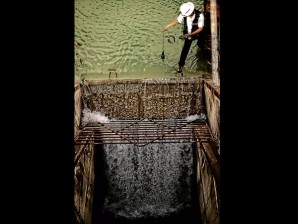Mutant tilapia found in rivers near breached mine-tailings pond of Philex

This is Philex Mining Corp. Tailings Pond No. 3 in Itogon town of Benguet, photo taken on December 1, 2011. EV ESPIRITU/INQUIRER NORTHERN LUZON
MANILA, Philippines—Mutant tilapias were reportedly found in the rivers of a mining village in Tuba, Benguet province after one of Philex Mining Corp.’s tailings pond leaked last August, a result of a fact-finding mission joined by the Catholic Bishops’ Conference of the Philippines (CBCP) said.
“Mutant tilapias were found in the pond. They looked different, with big heads and small bodies, which the workers eat,” Fr. Edwin Gariguez, executive director of the CBCP’s National Secretariat for Social Action, said in a press release Wednesday.
Barangay Padcal chairman Amuasen, a three-term barangay official in Benguet, had alleged that “toxic wastes can be seen in the dried and poisoned plants, trees and branches where the discharges from the dam flowed,” said a report of the independent fact-finding mission conducted on September 16 and 17.
Philex, the country’s biggest gold producer, has been slapped by the Department of Environment and Natural Resources (DENR) with a P1-billion fine for over 20 million metric tons of mine tailings that spilled from its Padcal mine straddling the towns of Itogon and Tuba following days of heavy rains spawned by typhoons “Ferdie” and “Gener” in August.
Amausen, the head of the Barangay Disaster Risk Reduction Management Council (BDRRMC), the fact-finding mission that the livelihood of the locals was also severely affected because they could no longer catch any fish in the Balog River since August 2.
The Philex mining’s tailings ponds first leaked on August 1 and seeped out three more time during the same month after the mining firm failed to plug the leak.
The DENR, through its Mines and Geosciences Bureau (MGB), ordered the suspension of operations of Philex on August 2 until the leakage is fixed.
Article continues after this advertisementDENR secretary Ramon Paje confirmed to the fact-finding body that the suspension order remains in effect.
Article continues after this advertisementBureau of Fisheries and Aquatic Resources (BFAR) Region 1 Director Nestor Domenden told the mission that “traces of heavy metals were found in the fish samples, but the ‘level of toxicity is not harmful for human consumption hence, is allowable’.”
They first tested fish samples taken on August 6 from San Roque Dam for the presence of the heavy metals Lead, Arsenic, Copper, Cadmium, and Mercury.
Domenden was further asked if they conducted tests on mutant tilapia found in some ponds within the Philex mining compound. He said he was not aware there were mutant tilapia in the compound but acknowledged it could be indicative of long-term exposure to heavy metals.
The team also interviewed Alipio Lictag, head of the local Pangbasan Goldpanners and Fisherfolks Livelihood Association, who said that the local residents “are not aware of the status of the tailings, its volume nor its impacts.”
“The water level is still very high and the smell of the water is unusual, particularly during the leak,” Lictag was quoted as saying.
He said that prior to the breach in the tailings dam, residents could normally catch about 25 kilos of tilapia every two days and 75 kilos of eel per week.
“Since the leak, fish catch decreased significantly. Tilapia catch is now down to six kilos every two days, while in areas near the mouth of Balog river, they cannot catch any fish anymore,” Lictag was quoted as saying in the report.
“This resulted in deprivation of livelihood opportunities particularly for this community near the mouth of creek where the tailing spill was concentrated,” he added.
Philex was facing fines of P1.034 billion for violating the Clean Water Act and its own Environmental Compliance Certificate. It was also losing an estimated P30 million per day due to the suspension of operations, Gariguez said.
He also noted that Philex’s chief operating officer Engineer Eulaio Austin Jr. said in an earlier statement during the initial leak incident that “the water and sediments that have been discharged from the tailings pond are safe and non-toxic.”
The CBCP led the investigation in cooperation with the Climate Change Congress of the Philippines (CCCP), representatives from Philippine-Misereor Partnership and its Northern Luzon Cluster, Caritas Baguio, Cordillera People’s Alliance, Peace Foundation, Pambansang Kaisahan ng mga Magbubukid ng Pilipinas, Katribu Indigenous Peoples’ Partylist, and Community Volunteer Missioners.